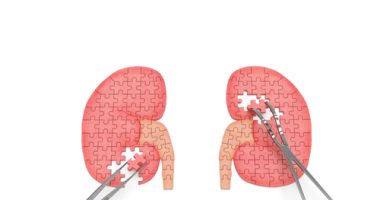New System Proposed for Classifying Collagen IV Gene Disorders as Types of Alport

An international group of experts has proposed a new classification system for genetic diseases linked to mutations in the collagen IV a345 molecule, suggesting all conditions are referred to as forms of Alport syndrome.
The study, “Alport syndrome: a unified classification of genetic disorders of collagen IV a345: a position paper of the Alport Syndrome Classification Working Group,” was published in the journal Kidney International.
Mutations (errors) in three genes – COL4A3, COL4A4, and COL4A5 – leads to defects in the collagen IV protein, the major constituent of the mature mammalian glomerular basement membrane (GBM), a part of the kidney.
These mutations are the cause of Alport syndrome and a milder disorder known as benign familial hematuria, or thin basement membrane nephropathy, and are linked to a broad spectrum of other kidney diseases, called nephropathies.
The existence of different names for several of these diseases is “confusing and can delay institution of appropriate nephroprotective therapy,” the experts wrote.
So they proposed a new classification system for genetic disorders linked to the collagen IV a345 molecule to allow early diagnosis and prompt treatment with the objective of improving renal (kidney) outcomes.
“Herein we propose the classification of all disorders arising from abnormalities of the collagen IV a345 molecule as forms of Alport syndrome,” they wrote.
They developed a new nomenclature system by modifying the existing one instead of creating a new system from scratch.
“In this revised nomenclature, Alport syndrome encompasses a phenotypic [group of symptoms] spectrum extending from nonprogressive, renal-limited disease to progressive, multisystem disease and a genetic spectrum that includes X-linked, autosomal, and digenic inheritance,” they wrote.
The new classification plan, which relies mostly on the detection of genetic mutations, categorizes the different diseases linked to collagen IV a345 into three types of Alport syndrome – X-linked, autosomal, and digenic.
X-linked Alport syndrome is caused by mutations in the COL4A5 gene; autosomal Alport syndrome results from mutations affecting the COL4A3 or COL4A4 genes in both alleles; and digenic (two genes cause the disease) Alport syndrome describes patients and families with mutations in two out of three genes, namely COL4A3, COL4A4, or COL4A5.
The new system, they said, offers several advantages, but probably the most important is to simplify the terminology to improve early diagnosis and treatment of Alport syndrome.
Also, researchers said the new system groups together a set of disorders with a shared molecular cause: mutations affecting the collagen IV a345 molecule.
This immediately signals those patients that are at risk of progressive renal disease and helps to promote continuous monitoring and early and appropriate therapies.
“Finally, this scheme provides an opportunity for patient advocacy groups and health information websites currently devoted to Alport syndrome to provide resources for patients and families previously given the diagnosis of thin basement membrane nephropathy,” the researchers and clinicians added.
The new classification system also means that patients previously diagnosed with a condition commonly linked to good outcomes, such as thin basement membrane nephropathy, would now be classified as Alport syndrome patients, which is associated with poorer outcomes.
The emotional burden of such a diagnosis can be mitigated, researchers said, by making patients understand that Alport syndrome is not always a progressive disorder, and sharing positive findings from recent studies showing that therapies can delay renal failure and improve the life expectancy of Alport syndrome patients.
The experts who proposed the new classification system are researchers and doctors from the U.S., China, Italy, France, Japan, and Germany.







Comments